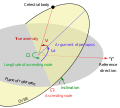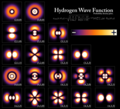An orbital node is either of the two points where an orbit intersects a plane of reference to which it is inclined. A non-inclined orbit, which is contained...
9 KB (951 words) - 05:11, 4 June 2025
the ascending node, also known as the right ascension of the ascending node, is one of the orbital elements used to specify the orbit of an object in...
5 KB (678 words) - 01:48, 25 September 2024
A lunar node is either of the two orbital nodes of the Moon; that is, the two points at which the orbit of the Moon intersects the ecliptic. The ascending...
15 KB (1,966 words) - 21:15, 25 April 2025
Orbital elements are the parameters required to uniquely identify a specific orbit. In celestial mechanics these elements are considered in two-body systems...
40 KB (5,777 words) - 10:46, 27 May 2025
Orbital inclination change is an orbital maneuver aimed at changing the inclination of an orbiting body's orbit. This maneuver is also known as an orbital...
7 KB (980 words) - 15:56, 14 October 2024
Nodal precession (redirect from Node rate)
as the orbital eccentricity. For a satellite in a prograde orbit around Earth, the precession is westward (nodal regression), that is, the node and satellite...
6 KB (911 words) - 17:51, 19 May 2025
Argument of periapsis (category Orbits)
ω (omega), is one of the orbital elements of an orbiting body. Parametrically, ω is the angle from the body's ascending node to its periapsis, measured...
4 KB (565 words) - 00:23, 24 September 2024
reference Lunar node, where the orbits of the Sun and Moon intersect Longitude of the ascending node, how orbital nodes are parameterized Lymph node, an immune...
4 KB (630 words) - 18:57, 3 December 2024
that its orbital plane is closer to the ecliptic plane instead of its primary's (in this case, Earth's) equatorial plane. The Moon's orbital plane is...
38 KB (4,679 words) - 05:42, 26 May 2025
In quantum mechanics, an atomic orbital (/ˈɔːrbɪtəl/ ) is a function describing the location and wave-like behavior of an electron in an atom. This function...
84 KB (10,931 words) - 18:34, 6 June 2025
of orbital transfer between non-coplanar orbits, the change-of-plane thrust must be made at the point where the orbital planes intersect (the "node")....
40 KB (5,763 words) - 17:20, 4 June 2025
ascension of the Moon in its precessional orbit around the Earth, also referred to as the north lunar node, and along with Ketu, is a "shadow planet"...
15 KB (1,630 words) - 19:22, 2 May 2025
called an ecliptic orbit. As non-inclined orbits lack nodes, the ascending node is undefined, as well as its related classical orbital elements, the longitude...
5 KB (689 words) - 18:00, 15 March 2025
longitude of the ascending node (Ω). By definition, the reference plane for the Solar System is usually considered to be Earth's orbital plane, which defines...
4 KB (388 words) - 05:49, 23 May 2025
reciprocal is the orbital frequency, a kind of revolution frequency, in units of hertz. According to Kepler's Third Law, the orbital period T of two point...
17 KB (2,080 words) - 13:46, 24 March 2025
In spaceflight, an orbital maneuver (otherwise known as a burn) is the use of propulsion systems to change the orbit of a spacecraft. For spacecraft far...
17 KB (2,151 words) - 15:12, 27 April 2025
In chemistry, orbital hybridisation (or hybridization) is the concept of mixing atomic orbitals to form new hybrid orbitals (with different energies,...
33 KB (3,204 words) - 20:53, 19 May 2025
An orbital pole is either point at the ends of the orbital normal, an imaginary line segment that runs through a focus of an orbit (of a revolving body...
8 KB (591 words) - 08:00, 1 February 2025
Glossary of astronomy (redirect from Orbital plot)
direction of the orbiting object and a plane of reference. orbital mechanics orbital node One of two points at which the plane of an orbit intersects a specified...
166 KB (19,171 words) - 07:09, 28 May 2025
Apsis (category Orbits)
Saturn, Uranus, and Neptune. The orbital nodes are the two end points of the "line of nodes" where a planet's tilted orbit intersects the plane of reference;...
42 KB (3,925 words) - 13:39, 30 May 2025
radial and angular nodes. A radial node for the hydrogen atom is a sphere that occurs where the wavefunction for an atomic orbital is equal to zero, while...
10 KB (1,365 words) - 13:49, 14 March 2025
astrodynamics, the orbital eccentricity of an astronomical object is a dimensionless parameter that determines the amount by which its orbit around another...
27 KB (2,869 words) - 14:19, 29 May 2025
depends on the Russian Orbital Segment for essential flight control, orbital station-keeping and life support systems. The US Orbital Segment consists of...
44 KB (4,592 words) - 03:01, 2 May 2025
the orbital speed of an astronomical body or object (e.g. planet, moon, artificial satellite, spacecraft, or star) is the speed at which it orbits around...
11 KB (1,411 words) - 23:02, 25 April 2025
Libration Lunar precession Lunar standstill Nodal precession Orbit of the Moon Orbital node Lunar node Harrington, Philip; Pascuzzi, Edward (2023-09-21). Astronomy...
5 KB (617 words) - 07:39, 27 March 2025
In orbital mechanics, a transfer orbit is an intermediate elliptical orbit that is used to move a spacecraft in an orbital maneuver from one circular...
1 KB (124 words) - 17:27, 11 October 2023
trajectory In orbital mechanics, a Lissajous orbit (pronounced [li.sa.ʒu]), named after Jules Antoine Lissajous, is a quasi-periodic orbital trajectory that...
8 KB (766 words) - 02:34, 13 November 2024
Lunar standstill (category Orbit of the Moon)
moon, the lunar nodes, and the perigee. Lunistices occur near in time to equinoxes and eclipses. This is because the moon's orbital inclination has periodic...
27 KB (3,407 words) - 02:15, 19 May 2025
center of the orbit is relatively close to the center of the Sun (relative to the size of the orbit). As seen from Earth, the planet's orbital prograde motion...
17 KB (1,860 words) - 12:44, 24 March 2025
satellites are located in middle circular orbit at 19,100 km (11,900 mi) altitude with a 64.8° inclination and an orbital period of 11 hours and 16 minutes (every...
72 KB (6,243 words) - 04:16, 16 May 2025















